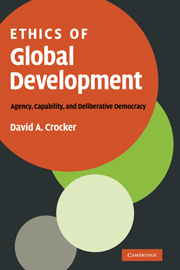Book contents
- Frontmatter
- Contents
- List of figures
- Acknowledgments
- 1 Introduction
- Part I Development ethics
- 2 Agreements, controversies, and challenges
- 3 Ethics and development theory-practice
- Part II The capability approach: ethical foundations
- Part III Strengthening and applying the capability approach
- Part IV Deliberative democracy, participation, and globalization
- Index of names
- Index of subjects
3 - Ethics and development theory-practice
Published online by Cambridge University Press: 22 September 2009
- Frontmatter
- Contents
- List of figures
- Acknowledgments
- 1 Introduction
- Part I Development ethics
- 2 Agreements, controversies, and challenges
- 3 Ethics and development theory-practice
- Part II The capability approach: ethical foundations
- Part III Strengthening and applying the capability approach
- Part IV Deliberative democracy, participation, and globalization
- Index of names
- Index of subjects
Summary
In the first chapter I discussed the aims and trajectory of development ethics and my own participation in this new field. In the last chapter I charted the commitments, areas of consensus, controversies, and challenges facing development ethicists in the early twenty-first century. In the present chapter I clarify further the tasks and methods of development ethics by situating them in the context of what I call “development theory-practice.” Before clarifying what I mean by this term and its various ethical and non-ethical components, it will be helpful to provide two examples of moral critique, ethical analysis of policy goals, and ethical norms or principles as they emerge in actual moral dialogue about development. How do development scholars and practitioners – as well as academic ethicists – appeal to ethical norms in evaluating the present, resolving ethical controversies, and envisaging a better future? Sometimes the norms are left unanalyzed; sometimes they are consciously scrutinized. Almost always they are linked to other components, to be analyzed in later sections of this chapter, of a specific development theory-practice. In the examples of ethical assessment and debate that follow, I also take up some of these substantive issues, especially as they apply to Costa Rica, and try to make headway in resolving them.
- Type
- Chapter
- Information
- Ethics of Global DevelopmentAgency, Capability, and Deliberative Democracy, pp. 67 - 106Publisher: Cambridge University PressPrint publication year: 2008



